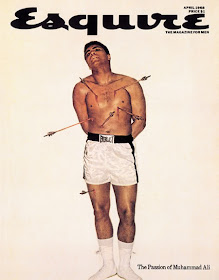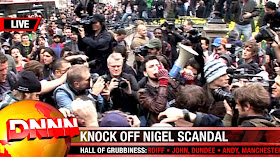When I were a lad, free papers had names like
The Citizen, or
The Advertiser, and featured headlines like "Spate of hanging basket thefts hits Chorley" or "Local man injured in refuse collection accident". They popped through the door once every fortnight, and were generally put to use lining the budgie's cage, or stopping oil getting on the kitchen floor when taking a scooter apart. As a news medium, they left a lot to be desired.
More recently in our fair capital, we've seen the rise (and in the case of one, fall) of a new kind of free newspaper, the evening rag. The London Paper, and the Lite look(ed) a bit more
proper - they didn't have ads for funeral directors on the front cover, and they weren't made from the same paper used for school loo roll. The Lite, which is the surviving title, is more a smorgasbord of pop culture and news snippets than a serious newspaper. Something you can pick up, read for two minutes, and put down again. That's not to do it down or be snooty about it, it works well for what it is - a quick diversion for commuters, something a bit more interesting than staring at the back of the man-in-front's head, or reading mind-numbingly bad tube card advertising. But a
serious newspaper it is not.
However, this week marks a quite remarkable event in
the media, as the London Evening Standard becomes Britain's first
proper newspaper to go completely free.
It's a brave and unprecedented attempt to reverse the fortunes of the paper, which has flagged in recent years. According to reports, the circulation was 450,000 a day, five years ago, but had sunk to an average of 116,192 a day last month. Those are pretty desperate statistics, and not surprisingly the Standard blames the rise of free London papers for it's predicament.

The last paid-for Evening Standard
The Standard is aiming to print 600,000 copies a day, and distribute them throughout central London, and on the back of that massive jump in readership, hoping to be able to increase its income from advertising by 40 per cent (up from an estimated £25m). A rise that would theoretically make up for the loss of the cover price, and more.
It's interesting because we have a value perception of the Standard, so getting one for free feels like a good deal. It's like when anything that normally costs us money is free - we want it. It's a bit like the story of the bloke who was trying to give away an old motorbike and parked it in his front garden with a sign that said "please take' - no one took it, because they assumed it was rubbish. So he put a different sign on it that said "For sale £25". And someone nicked it.
It's that perception of getting something for nothing that we used to have to pay for that makes it seem like a good deal. Whereas the papers that have always been free are just free papers. But, will that be enough to make 484,000 more Londoners pick one up?
Certainly I'd be more inclined to take a Standard than a Lite if they were side by side, not least because 'lite' is a terrible Americanism that I associate with a poor version of something. But mainly because I think I might learn of some actual news or hear of important events that had taken place in the world that day, not just who Pixie Raincloud went to a party with. Although
obviously I want to know about that too.
But will going free affect the journalism and style of the Standard, and if so, how? Will it change to attract the readers of the Lite? Will stories become shorter, will there be more coverage of
slebridies? Less meat and more sauce? I'm not holding the Standard up as some ultimate bastion of serious news reporting. But it has always felt more on a par with a national daily than your typical evening rag. I can imagine everyone over there must be really conscious of not
appearing to change, especially over the first few weeks, and no doubt the other papers will be watching it intently for any sign of dumbing down.
But there is an equally interesting question. Is it healthy for a serious newspaper to rely 100 per cent on ad revenue for its survival? Sure, we've all got used to the idea of free content, free entertainment, and with the growth of online, free news. We've come as consumers to expect most of these things to be free to us, but obviously they've got to be paid for somehow. This bold experiment may work wonders for the Standard, the economics may balance out. But just because it economically works, and just because want or expect things to be free, does that necessarily make it a good thing?
In the 1960s, advertising giant and radical thinker Howard Gossage wrote an excellent piece on the death of the The New York Times, Western Edition, entitled "What good is freedom of the press if there isn't one?" (from which, you'll gather, I hamfistedly paraphrased the title of this post). In it he makes the case that a newspaper should belong to its readership, in that it is their money (the cover price) that should keep it alive, not advertising revenue. This, he argues is the only way to guarantee a genuinely free press.
It's an interesting thought right now with The Standard, because notionally a paid for newspaper has a responsibility to its reader, but a newspaper that is kept alive wholly by money from advertising? Where do its responsibilities and allegiances lie? As a reader, should we still expect it to be us? What if that paper suddenly had the opportunity to break a huge scandal that affected the public at large, surely a dream scenario for any journalist? What if the subject of the scandal was a company, and that company was huge and represented a large chunk of that vital advertising revenue? Would we expect it to expose the very people it relies on for its survival? I don't know, I'm not suggesting anything so sinister or dramatic would ever happen, just using it as an example of how complicated it could become. And how, as readers and consumers, we can potentially lose our power simply by demanding that something be free.
Of course, we can always try to reclaim that power by using the paper to line the budgie cage.

The first free Evening Standard
One thing is for sure and that is that we live in very interesting, exiting times. Will the Standard's move be successful? Will the opposite move by News International and the Financial Times into more paid-for online news content work? Will the physical papers survive? Will online content remain largely free? And most of all, will it work out better for us, the reader and consumer? Will our increasing desire for free-ness leave us better off? Or not?
Any thoughts or opinions welcomed.
 If you've read a newspaper or a news website over the last couple of days, you've probably seen the stories about our good friends at Fentimans having their delicious lemonade branded an 'imitation liquor' by officials in the town of Houlton, Maine, in the good ole US of A. At the centre of the furore is the up to 0.5 per cent alcohol by volume that is created when Fentimans botanically brew their drinks.
If you've read a newspaper or a news website over the last couple of days, you've probably seen the stories about our good friends at Fentimans having their delicious lemonade branded an 'imitation liquor' by officials in the town of Houlton, Maine, in the good ole US of A. At the centre of the furore is the up to 0.5 per cent alcohol by volume that is created when Fentimans botanically brew their drinks.










































